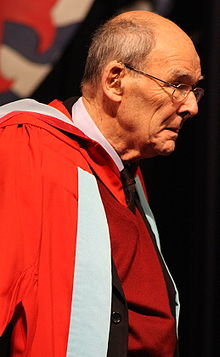Our website is made possible by displaying online advertisements to our visitors.
Please consider supporting us by disabling your ad blocker.
David Malet Armstrong
David Malet Armstrong | |
|---|---|
 Armstrong receiving his doctorate of letters (h.c.) at Nottingham University, UK on 13 December 2007 | |
| Born | 8 July 1926 Melbourne, Australia |
| Died | 13 May 2014 (aged 87) Sydney, Australia |
| Alma mater | University of Sydney |
| Era | 20th-century philosophy |
| Region | Western philosophy |
| School | Analytic philosophy Australian realism Immanent realism[1] Factualism Perdurantism (four-dimensionalism)[2] |
| Academic advisors | John Anderson |
Main interests | Metaphysics, philosophy of mind |
Notable ideas | Instantiation principle Quidditism[3] Maximalist version of truthmaker theory |
Preview warning: Page using Template:Infobox philosopher with unknown parameter "influences"
David Malet Armstrong AO FAHA (8 July 1926 – 13 May 2014),[4] often D. M. Armstrong, was an Australian philosopher. He is well known for his work on metaphysics and the philosophy of mind, and for his defence of a factualist ontology, a functionalist theory of the mind, an externalist epistemology, and a necessitarian conception of the laws of nature.[5]
Keith Campbell said that Armstrong's contributions to metaphysics and epistemology "helped to shape philosophy's agenda and terms of debate", and that Armstrong's work "always concerned to elaborate and defend a philosophy which is ontically economical, synoptic, and compatibly continuous with established results in the natural sciences".[6]
- ^ David Armstrong, Universals: An Opinionated Introduction (1989), p. 8.
- ^ Brian Garrett (2011). What Is This Thing Called Metaphysics?. Taylor & Francis. pp. 54–55. ISBN 978-1-136-79269-4.
- ^ Haecceitism (Stanford Encyclopedia of Philosophy)
- ^ "Professor David Armstrong - obituary". The Telegraph. 9 July 2014. ISSN 0307-1235. Retrieved 10 May 2020.
- ^ Brown, S.; Collinson, D.; Wilkinson, R., eds. (1996). Biographical Dictionary of Twentieth-Century Philosophers. pp. 31–32. ISBN 978-0-415-06043-1.
- ^ Jaegwon Kim; Ernest Sosa; Gary S. Rosenkrantz, eds. (2009). A Companion to Metaphysics (2nd ed.). Wiley-Blackwell. pp. 126–127.
Previous Page Next Page


